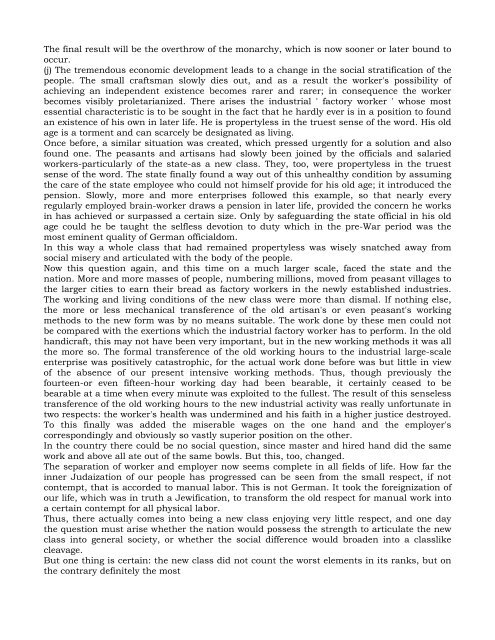Mein Kampf by Adolf Hitler
Mein Kampf by Adolf Hitler
Mein Kampf by Adolf Hitler
- TAGS
- kampf
- adolf
- hitler
- stuff2share.com
Create successful ePaper yourself
Turn your PDF publications into a flip-book with our unique Google optimized e-Paper software.
The final result will be the overthrow of the monarchy, which is now sooner or later bound to<br />
occur.<br />
(j) The tremendous economic development leads to a change in the social stratification of the<br />
people. The small craftsman slowly dies out, and as a result the worker's possibility of<br />
achieving an independent existence becomes rarer and rarer; in consequence the worker<br />
becomes visibly proletarianized. There arises the industrial ' factory worker ' whose most<br />
essential characteristic is to be sought in the fact that he hardly ever is in a position to found<br />
an existence of his own in later life. He is propertyless in the truest sense of the word. His old<br />
age is a torment and can scarcely be designated as living.<br />
Once before, a similar situation was created, which pressed urgently for a solution and also<br />
found one. The peasants and artisans had slowly been joined <strong>by</strong> the officials and salaried<br />
workers-particularly of the state-as a new class. They, too, were propertyless in the truest<br />
sense of the word. The state finally found a way out of this unhealthy condition <strong>by</strong> assuming<br />
the care of the state employee who could not himself provide for his old age; it introduced the<br />
pension. Slowly, more and more enterprises followed this example, so that nearly every<br />
regularly employed brain-worker draws a pension in later life, provided the concern he works<br />
in has achieved or surpassed a certain size. Only <strong>by</strong> safeguarding the state official in his old<br />
age could he be taught the selfless devotion to duty which in the pre-War period was the<br />
most eminent quality of German officialdom.<br />
In this way a whole class that had remained propertyless was wisely snatched away from<br />
social misery and articulated with the body of the people.<br />
Now this question again, and this time on a much larger scale, faced the state and the<br />
nation. More and more masses of people, numbering millions, moved from peasant villages to<br />
the larger cities to earn their bread as factory workers in the newly established industries.<br />
The working and living conditions of the new class were more than dismal. If nothing else,<br />
the more or less mechanical transference of the old artisan's or even peasant's working<br />
methods to the new form was <strong>by</strong> no means suitable. The work done <strong>by</strong> these men could not<br />
be compared with the exertions which the industrial factory worker has to perform. In the old<br />
handicraft, this may not have been very important, but in the new working methods it was all<br />
the more so. The formal transference of the old working hours to the industrial large-scale<br />
enterprise was positively catastrophic, for the actual work done before was but little in view<br />
of the absence of our present intensive working methods. Thus, though previously the<br />
fourteen-or even fifteen-hour working day had been bearable, it certainly ceased to be<br />
bearable at a time when every minute was exploited to the fullest. The result of this senseless<br />
transference of the old working hours to the new industrial activity was really unfortunate in<br />
two respects: the worker's health was undermined and his faith in a higher justice destroyed.<br />
To this finally was added the miserable wages on the one hand and the employer's<br />
correspondingly and obviously so vastly superior position on the other.<br />
In the country there could be no social question, since master and hired hand did the same<br />
work and above all ate out of the same bowls. But this, too, changed.<br />
The separation of worker and employer now seems complete in all fields of life. How far the<br />
inner Judaization of our people has progressed can be seen from the small respect, if not<br />
contempt, that is accorded to manual labor. This is not German. It took the foreignization of<br />
our life, which was in truth a Jewification, to transform the old respect for manual work into<br />
a certain contempt for all physical labor.<br />
Thus, there actually comes into being a new class enjoying very little respect, and one day<br />
the question must arise whether the nation would possess the strength to articulate the new<br />
class into general society, or whether the social difference would broaden into a classlike<br />
cleavage.<br />
But one thing is certain: the new class did not count the worst elements in its ranks, but on<br />
the contrary definitely the most


